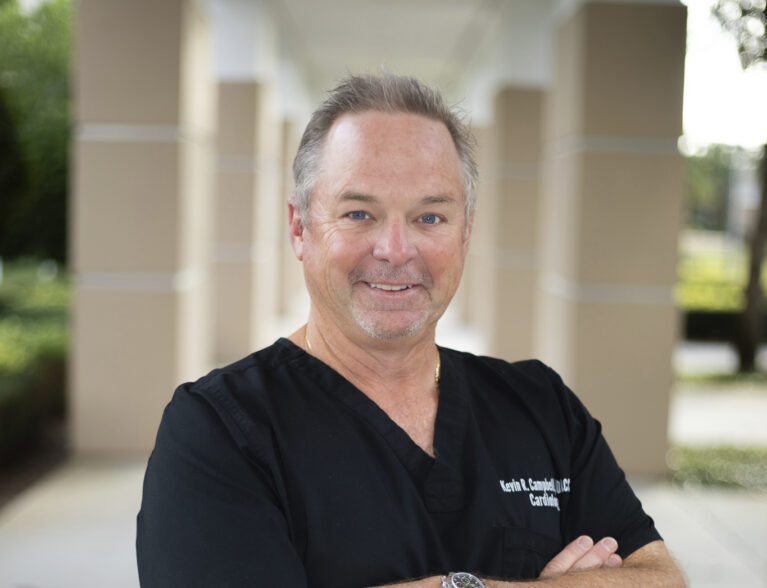
Heat is the leading cause of weather-related deaths in the United States, killing 1,600 people in 2021, more than triple the 500 that died from heat 20 years earlier in 2001.
As 90-degree days linger into autumn in Vero, Dr. Kevin Campbell, a cardiologist at Health First Medical Group, talks about the dangers of heat exhaustion, which can lead to heatstroke – a medical emergency – in a relatively short period of time and must be treated immediately.
“Once the body’s core temperature becomes 104 degrees or greater, it can lead to problems in a matter of minutes,” Dr. Campbell says. By that time, blood pressure has often dropped too low for too long, causing internal organs to become deprived of blood and therefore oxygen. The high temperature itself can also cause cell death, leading to organ failure.
Cleveland Clinic reports that people with heatstroke can develop shock or slip into a coma.
High body temperature can also lead to:
- Acute respiratory distress syndrome (ARDS).
- Brain swelling.
- Kidney failure.
- Liver failure.
- Metabolic dysfunction.
- Nerve damage.
- Reduced blood flow to the heart and other circulatory problems.
Untreated heatstroke can quickly damage the brain, heart, kidneys and muscles, according to Mayo Clinic. The damage worsens the longer treatment is delayed, increasing the risk of serious complications or death.
“Anyone can get heatstroke,” Dr. Campbell says, “but infants and the elderly are at especially high risk because their bodies may not be able to regulate temperature effectively.”
Kids playing sports, including high school football, also are at risk.
How do you know if you have it?
According to Dr. Campbell, “this condition can escalate in minutes. At first sign of altered mental status, confusion, slurred speech, delirium, seizures, vomiting or a racing heart, you should call 911 to seek medical help.”
Houston Methodist Hospital lists medications that increase heat sensitivity. They include:
- Diuretics – increase urine production, leading to fluid loss, decreased sweat production and potential dehydration.
- Anticholinergics – block the neurotransmitters that signal sweat glands, reducing sweat production.
- Beta blockers – slow the heart rate, limiting the body’s ability to circulate blood efficiently for cooling.
- Stimulants – increase metabolic rate, which can impair the body’s cooling mechanisms.
- Antidepressants – can affect the hypothalamus, which regulates body temperature, and can impair sweating.
Stimulants for attention-deficit/hyperactivity disorder (ADHD) and illegal stimulants such as amphetamines and cocaine also make you more vulnerable to heatstroke.
Certain chronic illnesses, such as heart or lung disease, can increase your risk of heatstroke. So can being obese, being sedentary, or having a history of previous heatstroke.
When you start to heat up from exertion or the temperature outside, your body moves warmer blood away from your internal organs and cooler blood toward them. The blood is redistributed from the body’s core to periphery so that heat can be released through your skin.
Capillaries at the skin’s surface fill with blood, which is why people often look flushed when they are hot.
You also perspire. As sweat evaporates, it cools the skin, lowering the temperature of the blood below. That blood then travels back to your internal organs to cool them down.
But when the air temperature is hotter than skin temperature (typically about 90 degrees) the body gains more heat than it can release.
Dr. Campbell says that humidity-related heat is hard on us. “It’s very oppressive. Our sweat doesn’t evaporate; it just drips off the skin without cooling it.”
In dry climates, sweat evaporation can continue to cool the body even at high temperatures, but that process becomes less effective as humidity increases. That’s why dry heat can feel cooler than humid heat.
“There are preventive steps we can take,” says Dr. Campbell. “Pre-hydrate as much as possible when you know you’re going to be outside. Take frequent breaks. Avoid alcohol and smoking. If you’re swimming or doing something water-related, you may feel more comfortable but the need to hydrate is still real.”
Dr. Campbell shares his concern about a problem that is all too common in Florida. “Our high school football season starts very early, while temperature and humidity are still high.
“Coaches, parents and student-athletes all need to be aware of potential problems and make sure water and shade are available. The key is that if the situation becomes an emergency, don’t wait – call 911 immediately.”
Kevin R. Campbell, MD, is a cardiologist at Health First. He completed fellowships at Duke University in Cardiovascular Disease and Cardiac Electrophysiology. He is a fellow of the American College of Cardiology. He has an MBA from his undergraduate alma mater, North Carolina State University. He is accepting new patients at Health First Medical Group-Spyglass, 7000 Spyglass Court, Suite 220, Melbourne. The phone number is 321-576-0646.



